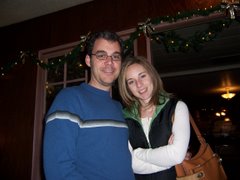Wednesday, July 18, 2007
Book Club
So we had our summer book club meeting tonight and enjoyed discussing "When Life and Beliefs Collide" by Carolyn Custis James. One issue we discussed in-depth is the mystery of concurrence. The author explains it like this: "This doctrine helps us understand that God is intimately involved in our lives and mysteriously exercises His will through our wills. Concurrence is when two actions occur simultaneously, or concurrently. It means that God is good and absolutely sovereign over all things, yet at the same time, we are not puppets or robots but have real choices and willingly exercise our wills." I love that because sometimes it seems like people come down on the issues of God's sovereignty and man's free will as an 'either/or' proposition, but the Bible teaches both. Concurrence seems to help tie it together some in my mind...it's still a mystery though.
Subscribe to:
Post Comments (Atom)

3 comments:
I just had a conversation with a girl about this a couple days ago. I haven't made it to that point in the book (or I missed it somehow), but that is a great way to put it!! She moved to Colorado last year and her time away has radically changed her world view... it's pretty cool to hear. But, that was very much what I was telling her as she was trying to understand God's sovereignty compared to our free will. Once again... balance is key!
Oh...and the peas comment. It was late and I was reading it as you ate the peas with the boys- and enjoyed it. That's what I was shocked about! ha! Re-reading it, I think you just meant that you used Gerber, right?
This is a long entry but I think you'll like it.
I was rereading a Madeleine L'Engle book again recently that has an analogy that I really like about this concurrence you were discussing (more about free will etc.). It is from the book "A Wrinkle in Time" and she refers to it again in "A Circle of Quiet"where she is talking to a group of writers/students and they are talking about structure and personal freedom. She said she wanted to show structure not as restrictive, pharisaic law but as a means to freedom.
Meg is to return to the evil planet Camazotz in an attempt to free her brother from the grip of the rigid structure that imprisons him. One of the characters is says..."If we knew ahead of time what was going to happen, we'd be like the people of Camazotz, with no lives of our own, with everything all planned and done for us. How can I explain it to you? Oh, I know. In your language you have a form of poetry called the sonnet...It is a very strict form of poetry, is it not? There are fourteen lines, I believe, all in iambic pentameter. That's a very strict rhythm or meter, yes? And each line has to end with a precise rhyme pattern. And if the poet doesn't do it exactly this way, it is not a sonnet, is it?...But within this strict form the poet has complete freedom to say whatever he wants, doesn't he?" Then Calvin says, "You mean you're comparing our lives to a sonnet? A strict form but freedon within it? "Yes...You're given the form, but you have to write the sonnet yourself. What you say is completely up to you."
Then she said "the students talked loudly about wanting to be free to dance, to make love, to be themselves. So do I. So we left literature and talked about the body, and I kept asking questions: what is it in you which gives you this freedom? Finally one of the young men, with great reluctance, pulled out the word: skeleton. It is our bones, our structure, which frees us to dance, to make love. Without our structure we would be an imprisoned, amorphous blob of flesh, incapable of response. The amoeba has a minimum of structure, but I doubt if it has much fun."
It is not an either or but a perfect balance of God's sovereignty and man's freedom. We are not truly free if we don't have that structure of Sovereignty. Mom
Post a Comment